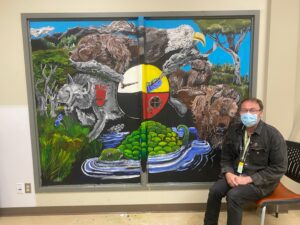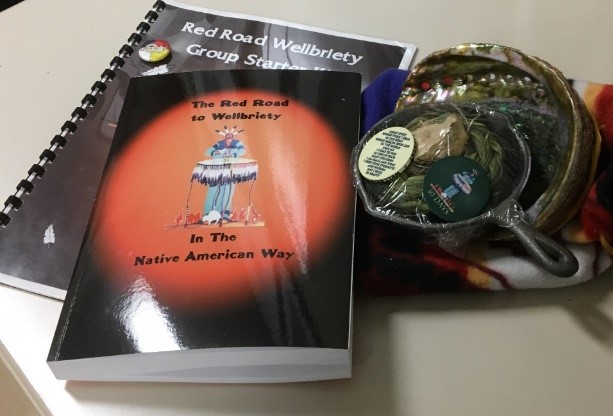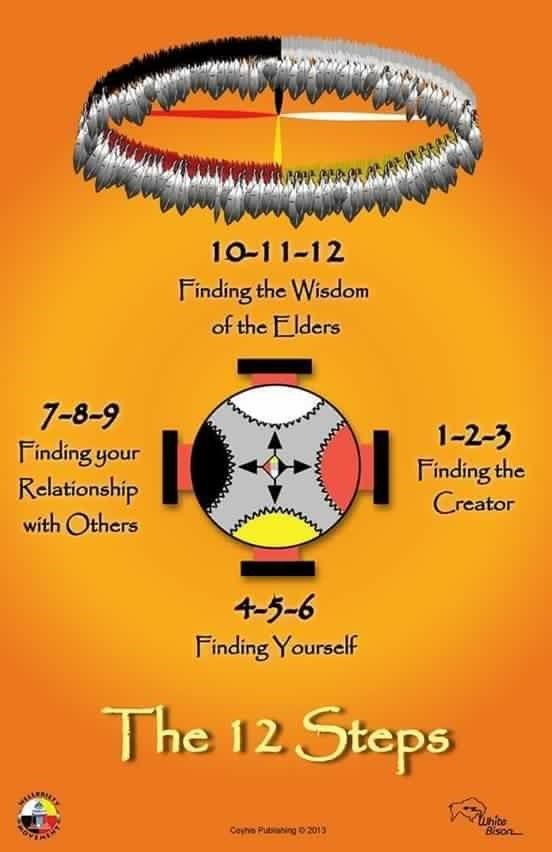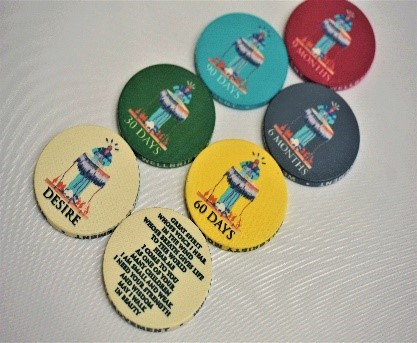Spotlight: Indigenous Peer Support
Shaundra Bruvall | May 24, 2024
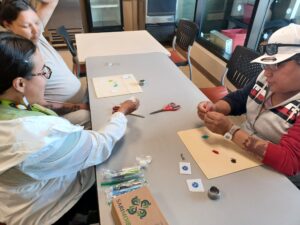
Augustine Hunter (Auggie) bottom left teaching earring making at Alpha House’s Detox
Alpha House has had Indigenous Peer Support Workers (IPSW) on staff for many years and we finally had a chance to sit down with one such worker, Augustine Hunter (or Auggie) to learn more about what her day looks like and the unique cultural activities she’s able to support in our Detox Program. Settled in our Wellness room, a culturally safe space for ceremony and gatherings, blessed by Elder Alvin Manitopyes in late 2022, Auggie, just back from a walk with clients, speaks enthusiastically about every aspect of the program.
Why are Indigenous Cultural Supports so important to you and the clients in the program?
“Usually, people want to learn the Indigenous route because it’s peaceful. Indigenous culture isn’t religious, but spiritual instead. When you’re working with a population facing addiction and homelessness, many of them feel disconnected from Mother Earth and The Creator as a result of their time on the streets. The role of an IPSW is to have those supports here for clients looking to detox; they need support and something to look forward to when they’re first coming into the program.”
We ask about the different activities she supports. The answer is a huge variety. Sharing circles to express feelings and experiences in a safe, non-judgmental space – both traditional sharing circles and shorter gathering circles— Wellbriety, a AA program with an Indigenous focus, sweat lodge ceremonies – a central part of reconnection with land and body for many – medicine walks, arts and crafts, and one-on-one peer connection.
Sharing Circles
Throughout the day, clients participate in traditional sharing circles, and shorter sharing circles, like thought/quote of the day. Shorter sharing circles, like thought of the day, offer a low stakes opportunity for clients to open up in a supportive group environment; this is especially helpful for easing clients who have a lot of walls up into sharing with a group, and could result in other breakthroughs down the line.
“Often they’ve [clients] gone through something traumatic and sharing circles allow them to read quotes from celebrities or writers or doctors – these are quotes that may apply to their life and we talk about those – it can be very helpful for clients”
Wellbriety
Wellbriety has been a big part of our cultural programming at Alpha House for many years, and is something we facilitate in-house. The Wellbriety Movement is a 12-Step AA/NA program that has been merged with the teachings of the Medicine wheel. This movement helps individuals heal from substance use, and also addresses and looks to heal the systemic intergenerational trauma that Indigenous peoples have faced historically. That’s not to say that Wellbriety is only for indigenous clients— individuals from all ethnic and cultural backgrounds are welcome and can benefit from the spiritual teachings rooted in indigenous culture. The start of each cycle is marked by welcoming returning clients, and is ended by recognizing participants who have completed the Wellbriety program.
“Me and my partner got our certifications to facilitate Wellbriety recently. I feel like we were meant to do this and I’m excited to share the spiritual side of the AA book. The foundations that Wellbriety is built on have been around almost 200 years– I’m excited to show them [clients] about the key routes to why we have pain – it isn’t just bout being angry or hurt – it’s more than that.”
Sweat Lodge Ceremony
Every week, our clients have the opportunity to attend a sweat lodge ceremony. Participants are driven out onto the land where they will enter a lodge made of wood and tarps/blankets to begin the ceremony. During the ceremony, the entrance to the lodge is closed and steam is created by pouring water onto heated rocks; this is to encourage the sweating out of negative energies in the body. There are brief reprieves where the entrance is open to let some steam out and to allow cold air to enter to prevent any health hazards. Sweat lodge ceremonies are intimate communal ceremonies that come with many benefits for clients including pain relief, relaxation and stress relief, and fostering a strong sense of community with the other participants.
“The connection between the individual to Mother Earth is central to Indigenous teachings Mother Earth gives us food, medicine, and our strength; even (and especially) during ceremony, she is present— the rocks (grandfathers), the water, and the branches that we use for ceremony all come from Mother Earth.”
Medicine Walks
One of the more frequent, and favourite, activities of the clients, are the medicine walks, where clients are taken out into nature to hear stories and learn about land-based medicine teachings. This can look like taking a group walk along the elbow river, or taking a group trip to Nose Hill Park, which gives clients the opportunity to hear different stories and learn about other medicines.
“The clients really love this – they always give thanks that they’re able to learn this stuff – always say they’re really happy to learn things they feel disconnected from.”
And it’s true that there are lots of interesting stories and facts to take in about all these long-standing locations in our city— the name of the elbow rives originating from the bend of an elbow, or how certain trees were used as camouflage by wolves while they hunted their prey, or how tree bark and buds from particular trees (like cottonwood or willows) can be used as a sort of alternative to Aspirin, due to the salicin found inside the bark/buds working to relieve similar symptoms like headaches, muscle soreness, and inflammation. These teachings alongside the physical exercise during the walks cumulate into a therapeutic experience for everyone involved.
While on the topic of medicine walks, Auggie recalled one of her favourite moments working at Alpha House:
During a medicine walk, I noticed that one client was struggling to make it up a hill. I approached him to see how he’s doing, and while looking up at the hot sun, he told me that he doesn’t think he can finish the medicine walk.
I chatted with him for a while as everyone took a rest, and reassured him that he could do the walk, but if he really wanted to turn back, then we could. He was still feeling a little unsure, so I offered up some advice: “…you’re looking to the distance, seeing how long the journey is, but you need to focus on the present moment and take it step by step. We will take breaks to sit down, learn, and engage with the teachings and stories of the knowledge keeper so, don’t worry, we’re not doing the whole walk in one go.”
By the end of the walk, he was at the front of the group, engaged in the stories and teaching of the knowledge keeper. I was so happy to see that he was able to finish the walk and asked him what had changed from the start of the medicine walk, where he could barely make it up a hill, to the end, where he was at the front of the group. He said that he took my advice and tried to pay attention to the stories and teachings as they walked and, before he knew it, he was engrossed in what the knowledge keeper was saying and forgot about his discomfort.
Arts and Crafts
Auggie shares that arts and crafts are one of her favourite activities to do with the clients, which she also believes to be an important step in recovery. Arts and crafts act as an opportunity for clients to engage with something they can succeed at, and that sense of pride and accomplishment they feel when finishing a craft can be an important part of improving their self-image.
“When you’re coming into recovery, you need to keep yourself busy. You get to talk and share stories and you can keep them [clients] engaged.”
Auggie tries to make the arts and crafts portion of the day a peaceful moment; she’ll sometimes lightly play some Indigenous music in the background while clients share stories, and work on their crafts.
Alpha House is always looking for more arts and crafts donations because it’s such a popular activity in our Detox program.
One-on-One Peer Connection
In between all the group activities, Auggie makes time to have one-on-one sessions with the clients to debrief what’s on their mind that day, traumatic experiences, and everything in between.
“Let them vent and sit with them, listen and then suddenly you’ll see an emotional person come out when you give them that room to feel. A lot of people are angry or disrespectful at first but that’s their way of defending themselves, once you peel back the layers, they’re kind humans.”
Projects
Alongside the regularly scheduled programming, staff are able to provide opportunities for Detox clients to get involved in fun projects that come up throughout the year. Recently, we had the pleasure of bringing in Trevor Prairie Chicken and Naomi Eyahpaise from Kiit Fine Arts to work with our clients to paint the tipi we’ve been using for our sweat lodge ceremonies. Other such opportunities include creative projects like painting community garden boxes, cultural reconnection camps, and even Superbowl parties and attending Calgary Flames home games.
What does Auggie like most about working at Alpha House? We wondered too:
“Helping the clients is my favourite part of doing this work. Even before Alpha House, I was doing outreach and helping people with addiction in the community. I felt like that was my purpose that the Creator gave me a couple of years ago, and I went with it…”
What does she see clients struggle with once they’ve finished the detox program?
“A lot of clients are scared to leave detox once they’re sober and finished the program. It’s hard to discover what sober fun is, especially when you don’t know any sober people. They [clients] need to stay connected to the community, we can’t do it alone.
We see some people that have slipped up and need to come back to detox, but we don’t judge that. It’s important to remember that recovery might not happen on the first, second, or even the twentieth try, but we keep trying for when that day does come around.
We can plant the seeds, but we need to keep watering them in order for them to grow.”
Her favourite part about the clients themselves?
“When they win, you win. That sits with me. I try to be what I didn’t have when I was on the street— someone to sit with and listen when they’re hurting. I needed help and I didn’t know how to ask for it, so now I try to be who I needed and that’s gotten me far in building relationships with the clients.
Some of the clients that we help here have reunited with their kids, some go back to work or school, and others are still in recovery. It makes us all happy to see them doing well out there.”
